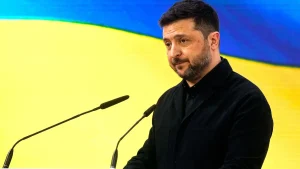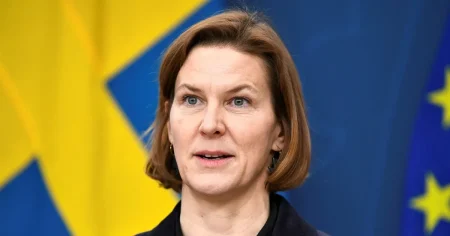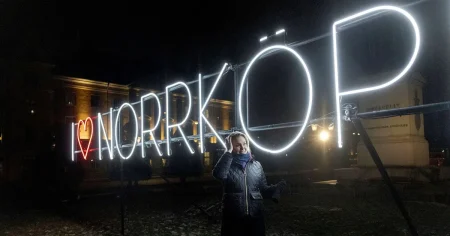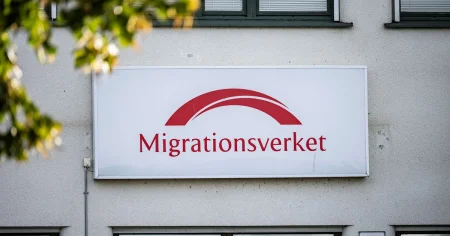The chilling murder of a woman in Kosovo’s capital, Pristina, on November 29, 2023, sent shockwaves through the Kosovar Albanian community and spiraled into an international investigation. The victim, a mother of two young children, was shot in the head at close range by a masked assailant while the family was returning from an evening out. Initially, the police treated the case as a robbery gone wrong. However, within 48 hours, the victim’s husband, a Swedish-Kosovar man in his 30s, was arrested, drastically shifting the narrative from random violence to something far more sinister. The husband, known for his social connections and political aspirations, had built a life that straddled both Sweden and Kosovo, fostering relationships with prominent figures in both countries. This sudden turn of events cast a long shadow over the man’s carefully cultivated image, transforming him from a rising star to the prime suspect in his wife’s murder.
The husband, raised in Bohuslän, Sweden, had divided his time between his home country and Kosovo in recent years. He had become an advisor to a well-known Kosovar politician and businessman, a position that granted him access to the upper echelons of Kosovar society. His social media presence showcased his connections to celebrities of Kosovar Albanian descent, including Dua Lipa and Rita Ora. Following his arrest, these online platforms, once a testament to his successful integration into both cultures, became inundated with messages of hatred and threats. The impact of the murder and subsequent arrest reached far beyond the immediate family in Kosovo. In Sweden, the man’s parents were forced into protective custody, and his two young children, who witnessed their mother’s brutal killing, were placed in foster care according to the Swedish law of care for young people (LVU). Official documents highlight the profound psychological trauma the children endured, necessitating specialized care and support to process the horrific event.
The case took another dramatic turn a year later when the Pristina prosecutor’s office held a press conference announcing the indictment of four men, including the victim’s husband. The prosecution alleges the husband orchestrated and financed his wife’s murder, offering €30,000 to a hired killer. According to the indictment, he initially approached his cousin to carry out the killing, but the cousin refused. Undeterred, the husband then connected his cousin with the eventual assassin. The prosecution further contends that on the day of the murder, the husband purchased the murder weapon, a black Zastava pistol, which he later handed over to the hired killer. This weapon was subsequently recovered during a search of the alleged shooter’s residence. The husband, the alleged shooter, and the cousin all face murder charges, while a fourth individual has been charged with a weapons offense.
The prosecutor, Javorka Prlinčević, revealed that crucial information obtained from Swedish authorities was instrumental in establishing a motive for the crime. While declining to disclose specific details of the evidence before the trial, Prlinčević alluded to a troubled marital relationship and property disputes between the couple during their time in Sweden. Court documents obtained by DN, a Swedish newspaper, show that the couple had filed for divorce in 2019 but ultimately reconciled during the reconsideration period. Adding another layer of complexity to the case, local Kosovar media have reported that the husband had taken out a life insurance policy on his wife in Sweden for 3 million kronor (€260,000) in the summer of 2022, further fueling speculation about his potential motive.
The husband, through his lawyer, Teuta Zhinipotoku, has vehemently denied all charges. Zhinipotoku, in communication with DN, expressed concern over the dissemination of false information during the investigation, which she claims has negatively impacted the defense’s work. She maintains that further public comment would be unproductive at this stage and that the legal process should be allowed to run its course. In Swedish legal documents related to the custody of the children, the husband maintains his innocence regarding the murder allegations. The date for the trial in Kosovo remains unscheduled, leaving many questions unanswered as the legal proceedings unfold.
The case has touched upon various sensitive issues, from domestic disputes and financial motivations to the complexities of cross-cultural relationships and the challenges faced by immigrant families. It has also highlighted the devastating impact of violence on children and the need for swift and comprehensive support systems. The upcoming trial will undoubtedly attract significant attention, not only in Kosovo and Sweden but internationally, as the court seeks to unravel the truth behind this tragic and perplexing case. The trial holds the promise of providing answers and closure, not only for the victim’s family but also for the communities grappling with the aftermath of this shocking crime.














